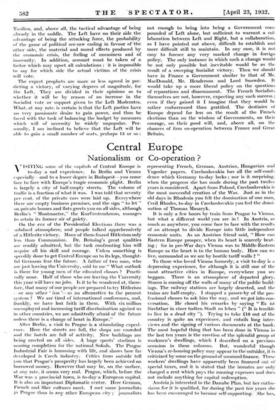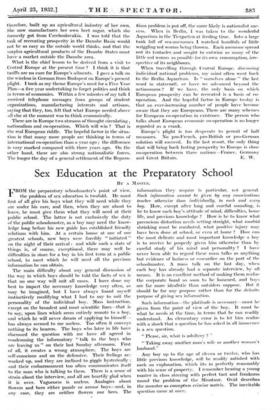Central Europe
Nationalism or Co-operation ?
V ISITING some of the capitals of Central Europe is- V to-day a sad experience; Berlin and Vienna especially—and to a lesSer degree in Budapeit—you come face to face with Europe's tragic economic plight. Berlin is largely a city of half-empty streets. The volume of traffic is a fraction of What it was. I was told that seventy per cent. of the private cars were laid up. Everywhere there arc empty business preMises, and the sign " to let " on private houses and flats greets you on all sides, although Berlin's " Montmartre," the Kurffirstendamm, manages to retain its former air of gaiety.
On the eve of the Presidential Elections- there was a subdued atmosphere, and people talked apprehensively Of a Hitlerite victory. Many of them feared Hitlerism only less than Communism. Dr. Bruning's. great qualities are readily admitted, but the task confronting him will require all his skill and courage. Unless something is speedily done to get Central Europe on to its legs, thought- ful Germans fear the future. A father of two sons, who are just leaving the University, said to me " What outlook is there for young men of the educated classes ? Practi- cally none. Half of those who are leaving the University. this year will have no jobs. Is it to be wondered at, there- fore, that many of our people are prepared to try Hitletis' m
---or any other an alternative to the present system ? We are tired of international conferences, 'and, frankly, we have lost faith in them. With six million unemployed and increasing tariff discrimination against us in other countries, we are admittedly afraid of the future sinless there is a change of heart in Europe."
After Berlin, a visit to Prague is a stimulating experi- ence. Here the streets are full, the shops are crowded and the hotels are full of activity. New buildings arc being erected on all sides. A huge sports' stadium is nearing completion for the national Sokols. The Prague Industrial Fair is humming with life, and shows how far developed is Czech industry. Critics from ontside" tell you that Prague's prosperity haS largely been 'achieved on borrowed money. However that may- be, on the surface, at any rate, it scents very real: Prague, which, before the War was a provincial town, is to=day a European capital. It is also an important Diplomatic centre. Here German, French and Slav cultures meet.. - T met' more 'journalists in Prague than in any other European city ; journalists
representing French, German, Austrian, Hungarian and Yugoslav papers. Czechoslovakia has all the self-confi- dence which Gerinany to-day lacks ; nor is it surprising, when the progress she has made during the past twelve years is considered. Apart from Poland, Czechoslovakia is the most successful creation of the War. Just as in the old days in Rhodesia you felt the domination of one man, Cecil Rhodes, to-day in Czechoslovakia you feel the domi- nation of Thomas Masaryk.
It is only a few hours by train from Prague to Vienna, but what a different world you are in ! In Austria, as much as anywhere, you come face to face with the results of an attempt to divide Europe into little independent economic units. As an Austrian friend said, " How can Eastern Europe prosper, when its heart is Scarcely beat- ing ; for in pre-War days Vienna was to Middle-Eastern Europe as the heart is to the human body. How can we live, surrounded as we are by hostile tariff walls ? "
To those who loved Vienna formerly, a visit to-day is a depressing experience, for although it is stilt one of the most attractive cities in Europe, everywhere you see beggars. There is an atmosphere of departed glory. Stucco is coming off the walls of many of the public build- ings. The railway stations are largely deserted, and the trains are half-empty. I stopped a passer-by of the pro- fessional classes to ask him the way, and We got into con- versation. He closed his remarks by saying " Es ist ffirehtbar in einer todten Stadt zu leben (" It is terrible to live in a dead city "). Trying to take £10 Out of the country is quite an experience, and entails long inter- views and the signing of various documents at the hank. The most hopeful thing that has been done in Vienna in the last ten years is the erection of the 'splendid group of workmen's dwellings, which I described on a previous occasion . in these columns. But, wonderful' though Vienna's re-housing policy may appear to the'outaider, it is criticized by some on the ground of unsound finance. These workers' dwellings have apparently been financed out of special taxes, and it is stated that the inmates are only charged a rent which pays the running expenses 'and does not include anything for capital redemption: ' Austria is interested in-the Danube Pfau, but her enthu- SiaSin for it is qualified, for daring the past ten years she has been encouraged to beCoine Self-supporting; She has, therefore,- built up an agricultural industry of her own. She now manufactures her own beet sugar, which she formerly got from Czechoslovakia. I was told that the task of recreating prosperity in the Danube Basin would not be as easy as the outside world thinks, and that the surplus agricultural products of the Danube States must have a market outside the Danube area.
What is the chief lesson to be derived from a visit to Central Europe at the present time ? I think it is that tariffs are no cure for Europe's ailments. I gave a talk on the wireless in German from Budapest on Europe's present plight. I took as my theme Europe's need for a Five Year Plan—a five year undertaking to forget politics and think in terms of economics. Within a few minutes of my talk I received telephone messages from groups of student organizations, manufacturing interests and artisans, saying that they, too, felt that what Europe needed above all else at the moment was to think economically.
There are in Europe two streams of thought circulating nationalism and co-operation. Which will win ? That is the real European riddle. The hopeful factor in the situa- tion is that many more people are thinking in terms of international co-operation than a year ago ; the difference is very marked compared with three years ago. On the other hand, there are also strong nationalistic forces. The longer the day of a general settlement of the Repara- *ions problem is put off, the more likely is nationalist suc- cess. When in Berlin, I was taken to the wonderful Aquarium in the Tiergarten at feeding time. Into a large tank full of sea-anemones I watched handfuls of little wriggling red worms being thrown. Each anemone spread out its tentacles and sought to entwine as many of the little red worms as possible for its own consumption, irre- spective of its neighbours.
When travelling through Central Europe, discussing individual national problems, my mind often went back to the Berlin Aquarium. Is " ourselves alone " the last word in stateeraft, or have we advanced beyond the actinozonns ? If we have, the only basis on which European prosperity can be recreated is a basis of co- operation. And the hopeful factor in Europe to-day is that an ever-increasing number of people have become aware that they are Europeans. There are many schemes for European co-operation in existence. The person who talks about European economic co-operation is no longer regarded as a crank.
Europe's plight is too desperate to permit of half measures. No pro-French, pro-British or pro-German solution will succeed. In the last resort, the only thing that will bring back lasting prosperity to Europe is close co-operation between three nations--France, Germany







































 Previous page
Previous page